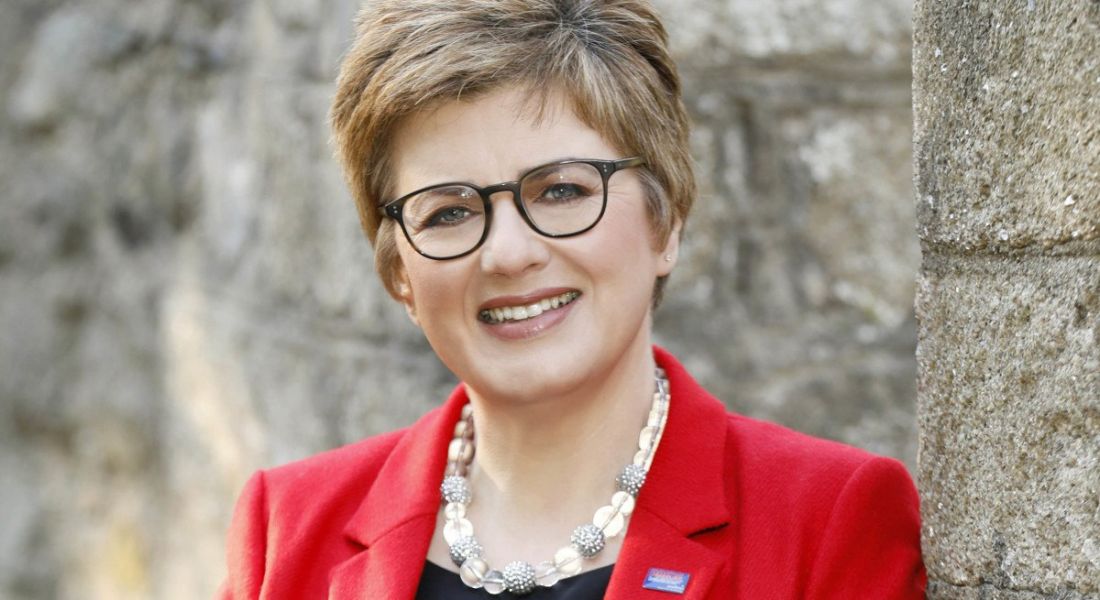From training as a chef to achieving her global position in Sodexo, Margot Slattery talks career paths, cultivating true inclusion and coming out.
Margot Slattery is the global chief diversity and inclusion officer at Sodexo, meaning that she holds responsibility for the direction, implementation and alignment of the company’s integrated global diversity and inclusion initiatives. On top of that, Slattery was also recently elected as president of the France-Ireland Chamber of Commerce (FICC).
But where did her career path begin? You might be surprised to learn that Slattery started off as a professional chef. In the early 1990s, she moved into management after joining Sodexo, which provides food services and facilities management to business clients.
She moved up through the ranks over the years, eventually becoming the company’s country president for Ireland and Northern Ireland in 2015, before taking on her current role last year.
‘See yourself and your orientation as one part of the jigsaw of life and be ready to soar and thrive’
– MARGOT SLATTERY
What experiences led you to where you are today?
I grew up in a loving family, part of a close-knit but conservative rural farming community in the west of Ireland in the 1980s. I always felt somehow different and that sense of not truly belonging definitely made me feel a bit fearful in my teenage years. Once I completed my chef training in Galway-Mayo IT, I took off for Dublin and London. But that fear persisted until I joined Sodexo Ireland in the early 1990s as a very junior manager.
Sodexo was a major turning point in my career as it was immediately obvious that being different wasn’t a negative and the culture of inclusion was lived out every day. When I finally came out, it was no surprise to my colleagues or even my family. It’s a joy to know that I can be myself, speak up and be in an environment that allows me to bring my whole self to work. It’s an environment that has encouraged and supported me in promoting diversity and inclusion outside work as well.
Sodexo has a strong culture of people development and you could say that I am a walking example of that! With them, I’ve had a long and varied career in catering operations, working on the frontline and in management roles. Our clients are involved in a very broad range of activities, from business, industry, banking and finance to pharma, healthcare and government services, so our partnerships with them have exposed me to a broad spectrum of experience and insight across many sectors.
Outside Sodexo, I’ve always been very involved in the LGBT community, especially working with NGOs and organisations looking for a change in society, like GLEN [Gay and Lesbian Equality Network], Outhouse and BITCI.
Has it been a straightforward path or were there surprises along the way?
My career certainly wasn’t straightforward. I have always had to take the road less travelled for a variety of reasons. I came to my working life during a time of great economic uncertainty, especially in Ireland, so my career path was not linear, especially in my earlier years, and probably not helped by a lack of strong career guidance supports at school. Thus, I have been very lucky to join an organisation like Sodexo that truly supports my personal and professional development.
What, in your opinion, does true diversity and inclusion look like?
In my opinion, true diversity and inclusion is where people are free to be themselves and to express themselves, to be open and questioning, where people feel a sense of purpose and belonging.
This, in turn, helps companies to be open to innovation, to new ideas and growth and to follow new paths. It provides a space for people and companies to grow and thrive.
Within Sodexo, we have moved beyond asking why diversity matters towards asking how we can create a more inclusive culture together. The fact is that diverse organisations are more profitable, enjoy better employee retention and engagement and outperform their competitors across a range of other measures.
It can be too easy to make it just a box-ticking exercise so that it looks good but has no substance. That does not result in real change. The way to navigate this is to ensure the board and executive committee are truly committed to the process with a designated leader, and that it’s built into the company strategy for investment, planning, measurement and support.
Our #StandByUs campaign launched yesterday… to grab yourself a beautiful pin badge & pledge card (not to mention lanyard) visit our page on Sodexo_Net for details on what you need to do. #StandByUs #SodexoPride pic.twitter.com/kmfkV0xo9B
— Sodexo Pride UK&I (@SodexoPrideUKI) February 11, 2020
What would your advice be to your younger self just setting out on your career path? Or to other members of the LGBTQ community who are still finding their feet at work?
To coin an iconic phrase, feel the fear and do it anyway! Don’t give all the reasons why you should not the power to stand in your way.
For other members of the LGBTQ community, my advice is not to be limited by any societal, familial or personal self-beliefs. See yourself and your orientation as one part of the jigsaw of life and be ready to soar and thrive.
What are you most excited about in your new role as president of the FICC?
Once this crisis is behind us, I want to ensure that the FICC is dynamic and agile in anticipation of what may be a very different business environment post-Covid-19. My vision for the FICC is to build on its current position as a valued player and influencer in the business relationships in Ireland and France in the new EU landscape.
As my day job is all about inclusion, I will be working closely with our director, Cliona McGowan, and her team to make sure that inclusion is a lived reality for all involved in the Chamber and that we continue to bring relevant topics and debates and matters to the fore in this very important area.
What are some of your favourite resources, books and podcasts that you’d recommend to others?
There are loads. My list of resources covers pretty much all the broadcast, print and online media in Ireland and the UK, and international outlets like the New York Times and Harvard Business Review.
I travel quite a bit, so I relish a mix of podcasts and audiobooks for business and pleasure. The list includes the BBC’s Women’s Hour, Desert Island Discs, In Our Time, The Food Programme and Fortunately… with Fi and Jane, alongside RTE’s Documentary on One, the Irish Times’ Women’s Podcast, How to Fail with Elizabeth Day and Work Like a Woman with Mary Portas.




